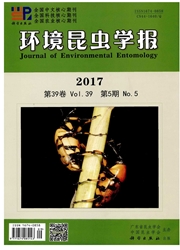

 中文摘要:
中文摘要:
植物对昆虫产卵刺激产生的防御反应不仅可以直接抑制卵的发育,还可以为防御下一步若虫/幼虫带来的危害做准备。对褐飞虱产卵处理后水稻植株内一氧化氮(NO)合成的关键酶-硝酸还原酶基因的表达量和NO含量进行测定,对比褐飞虱取食和机械损伤处理,结果显示褐飞虱产卵能够诱导水稻硝酸还原酶基因的表达和NO的生成。处理后12 h,水稻硝酸还原酶基因表达量显著高于取食和和机械损伤处理;12-24 h产卵诱导的NO含量显著高于对照和机械损伤组水稻。褐飞虱产卵诱导水稻启动NO合成关键基因的表达和物质合成表明,与取食危害类似,水稻同样会对褐飞虱产卵刺激产生响应,诱导NO升高,启动相应的植物防御体系。
 英文摘要:
英文摘要:
Herbivorous insects laying their eggs on plant tissue face the risk of aggressive plant responses that either have direct negative effects on eggs or inform parasitoids about the presence of eggs and thus indirectly harm the eggs by involving the third trophic level and, plants can take insect egg deposition as a warning signal of future larval herbivory. Compared to the rice brown planthopper ( BPH ) Nilaparvata lugens ( St?l) feeding and mechanical wound, BPH oviposition upregulated the transcripts of rice Nitrate reductase gene and NO substance levels. After BPH oviposition treatment of 12 h, the expression levels of Nitrate reductase gene were significantly higher than BPH feeding and mechanical wound treatment, the content of NO substance was significantly higher than untreated rice. These results indicate that, as feeding damage as, rice could be respond to BPH oviposition through inducing NO substance and initiating relevant defence systems, which inhibit the damage of BPH.
 同期刊论文项目
同期刊论文项目
 同项目期刊论文
同项目期刊论文
 Molecular characterization, of cytochrome P450 CYP6B47 cDNAs and 5 '-flanking sequence from Spodopte
Molecular characterization, of cytochrome P450 CYP6B47 cDNAs and 5 '-flanking sequence from Spodopte 期刊信息
期刊信息
